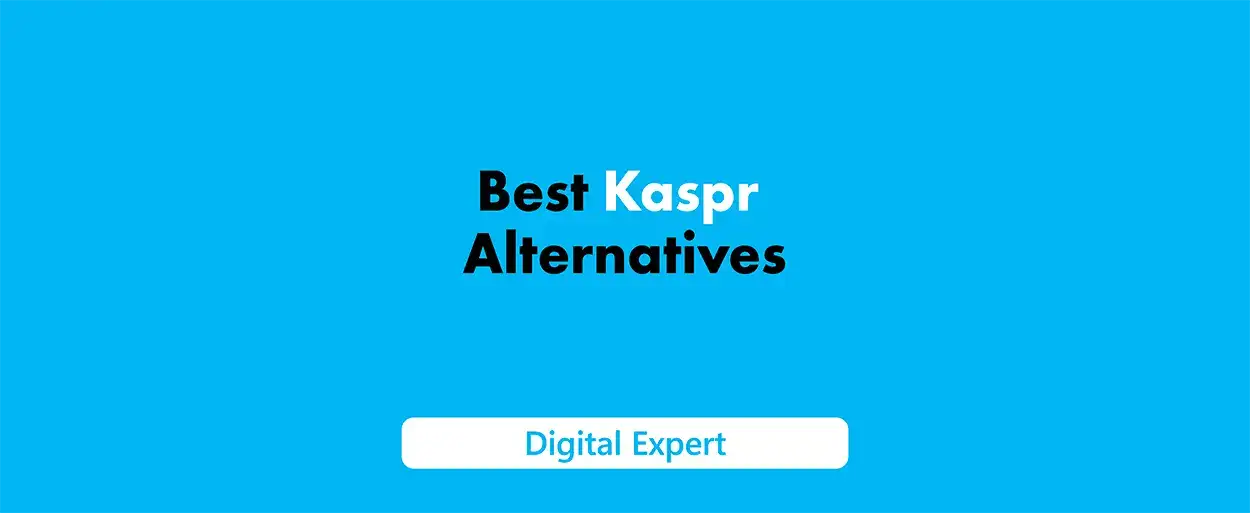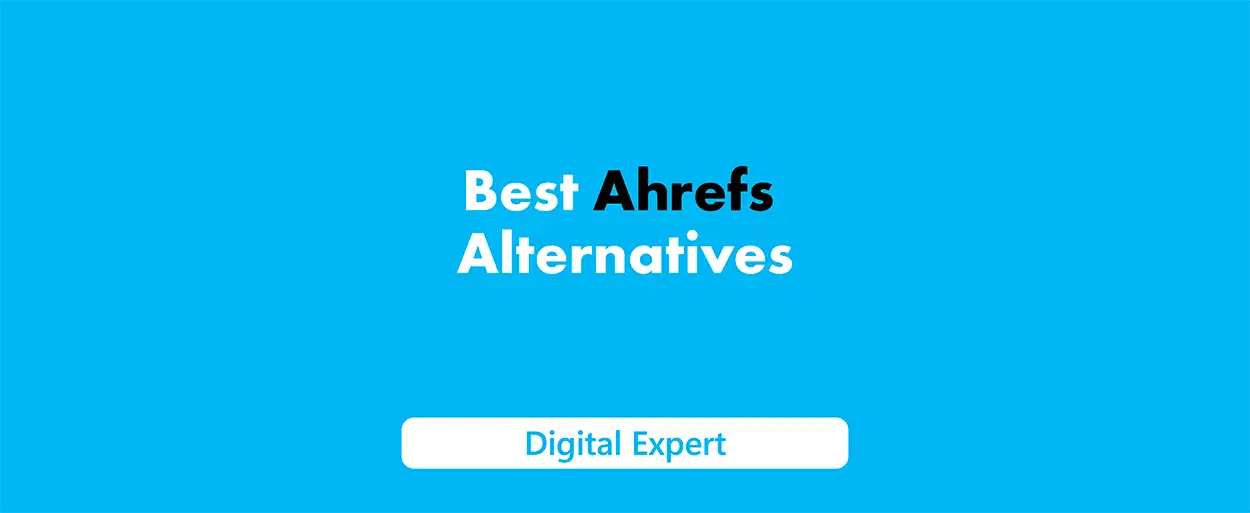Using the right MOOC platform, such as Udemy, could determine whether your new skill is successful next quarter. The headline battle - edX vs Coursera - splits more than 250 million learners worldwide into two camps: those who crave university-style rigor and those who want market-ready certificates delivered fast. They were both created in 2012, collaborate with top universities and you can start using them at no cost, but their courses, which offer the highest quality education, fees and learning styles are not the same.
It examines all the details, backgrounds and additional costs so you can begin applying to schools instead of searching forums. After reading, you will understand when to choose Coursera or edX and why we believe Coursera is the best choice for most ambitious professionals in the coming years.
👉 Start a 7-day free trial and explore 7,000+ courses!
Coursera vs edX: Quick Summary Table
Metric |
Coursera |
edX |
|---|---|---|
Launched |
2012 (Stanford origin) |
2012 (Harvard + MIT origin) |
Total courses |
≈ 7,000+ across 11+ categories |
≈ 3,300 university-level courses |
Flagship formats |
Specializations, Professional Certificates, full online degrees |
MicroMasters, Professional Certificates, credit-eligible master’s courses |
Subscription option |
Coursera Plus – unlimited access ($59/mo or $399/yr) |
None – pay per course |
Free study mode |
Audit most classes; upgrade for graded work & certificate |
Audit most classes; upgrade for graded work & certificate |
Mobile app & offline |
Robust iOS/Android app with downloads |
Solid iOS/Android app with downloads |
Signature strength |
Career-ready skills & job–aligned certificates |
Academic rigor & credit pathways |
Ideal for |
Learners chasing job-ready credentials and breadth |
Learners wanting university-style depth |
Quick verdict |
Edge to Coursera for scale, flexibility, and career focus |
Best when you need a specific flagship university course |
Need a fast decision on edX vs Coursera? The data in the table reveals that Coursera is the better choice for most purposes, but if you want a tough Harvard-style curriculum, edX is the way to go. In short, when someone asks “Coursera vs edX— which suits me?” the answer comes down to breadth and career momentum (Coursera) versus depth and academic prestige (edX).
Also you should read our article - Mangools vs Ahrefs. In this article you can find our decision in choosing best SEO tool for your needs!
Coursera Overview
In 2012, Stanford professors introduced Coursera, which is now the biggest online courses learning platform and course provider in the edX vs Coursera market by offering classes to 168 million students and partnering with 350 + universities and companies, including Stanford, Yale, Google, and IBM. At present, the site offers more than 7,000 courses and over 10,000 learning products which is almost twice the number edX has.
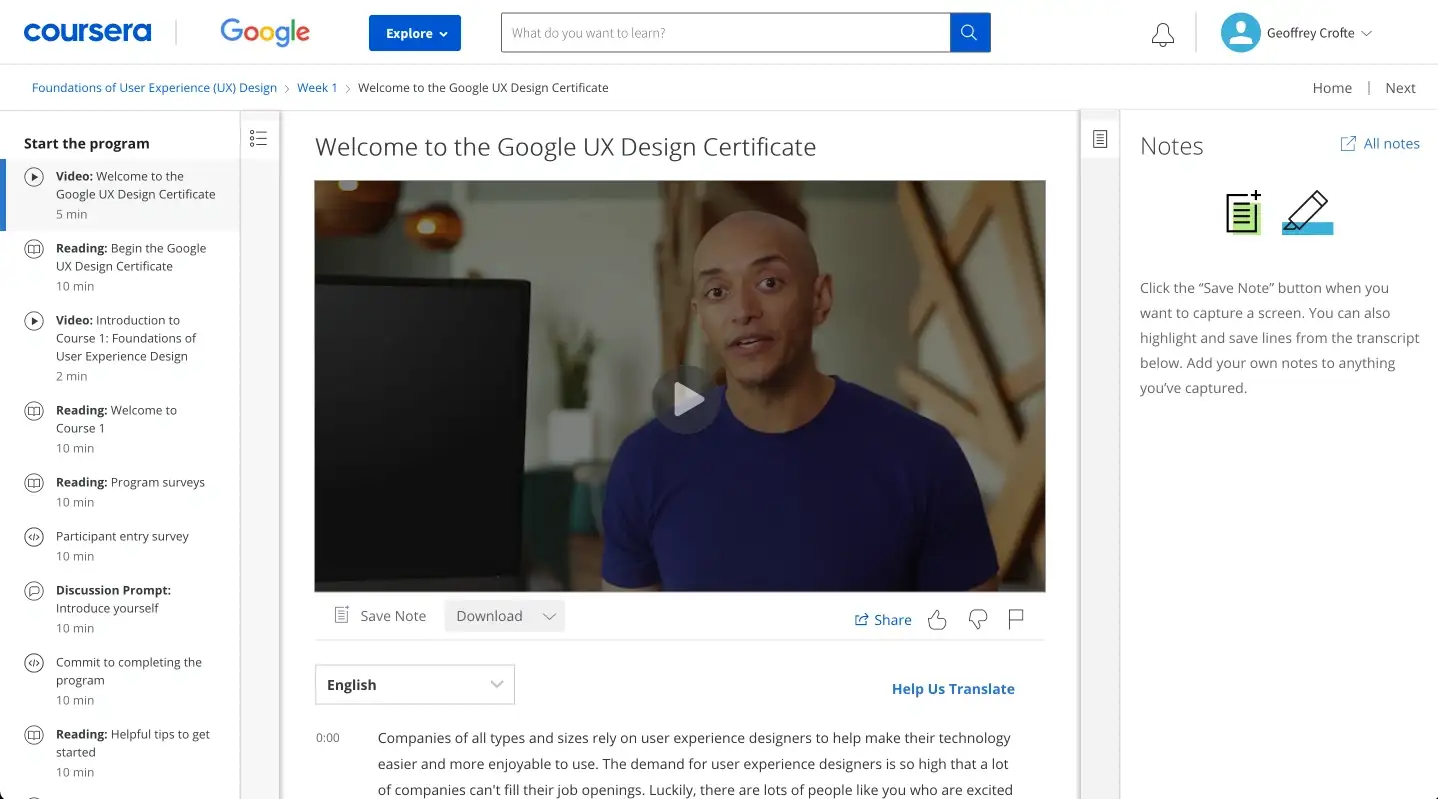
Coursera is especially effective because it provides a variety of courses, including individual courses and a lot of courses. Along with taking single courses, learners may complete Specializations, gain certificates from leading companies, or finish online bachelor’s degrees, including a Bachelor of Science, and master’s degrees at a lower cost than regular classes. The lessons teach job-related skills and are regularly updated by specialists to reflect the newest job trends.
The price can be adjusted based on the situation. You may take courses just for learning, pay for a particular certificate, earn a bachelor’s degree with the University of London, or gain access to 90 % of the catalog with Coursera Plus for $59 a month or $399 a year. It is simple to use, you can study offline and seeing your progress inspires you. In short, when people ask “coursera vs edx— which platform covers more ground for beginners?” Coursera is in the lead due to its extensive range of courses, monthly subscriptions and certificates that companies respect.
edX Overview
In 2012, edX was founded by MIT and Harvard and it continues to be very academic. The site has ≈ 80 million users and is partnered with 260 + universities, including Oxford, Berkeley, Imperial College, IBM and others. Instead of focusing only on the number of courses, edX offers ≈ 3,300 university-level courses, including some of the top courses available, and another 1,300 program bundles, including MicroMasters, Professional Certificates and online master’s degrees.

Normally, you can watch any class for free and if you want assignments or a certificate, you can upgrade to the Verified Track for a fee (ranging from $50 to $300). Since edX is pay-per-course, there is no subscription available, so it may not be the best choice for those who want to study a lot.
Even though the catalog is not large, edX offers in-depth courses and certificate programs. Usually, the syllabus used in an online course is the same as the one for the campus version and the professor is the same too. Should you need a program that provides research-quality learning and can be credited toward your future, edX offers a classroom-like experience right online.
Course Catalog Comparison
edX vs. Coursera are different because edX offers many free courses, while Coursera focuses on a few specific ones. This comparison of edX and Coursera highlights that Coursera provides many short courses, specializations, and degrees, while edX offers university courses that take one semester to complete. According to various user reviews, here is a brief overview of what every library offers:
Catalog metric |
Coursera |
edX |
|---|---|---|
Approx. total courses |
7,000 + |
≈ 3,300 |
Program bundles |
Specializations, Professional Certificates, Guided Projects, MasterTrack, full degrees |
MicroMasters, Professional Certificates, XSeries, full master’s degrees |
Subject depth |
Strong in tech, data, business, soft skills, languages, wellness |
Strong in computer science, engineering, math, public health, humanities |
New corporate content |
Google, IBM, Meta, Salesforce, Intuit, AWS |
IBM, Microsoft, Linux Foundation (fewer overall) |
Academic rigor |
Varies by creator; industry focus boosts job readiness |
Mirrors on-campus syllabi; rigorous assessments |
Search filters |
Topic, skill level, language, accreditation, job role |
Institution, subject, level, credit eligibility |
Stand-out edge |
Volume and variety—easy to binge multiple topics |
University authenticity—deep dives and credit paths |
If learning Python and marketing analytics on the same platform appeals to you, Coursera’s range of courses is almost endless. If you prefer a tough class that could earn you graduate credit, edX is the better option for you. Basically, if you are deciding between edX and Coursera for courses, it depends on whether you prefer a broad range or in-depth courses. Many multi-topic learners prefer Coursera because it offers more courses.
Check our article about "Sitechecker alternatives" and find best SEO tools for your website!
Certificates & Credentials
Since you will present your certificate to employers, its importance is significant in the context of academic degrees. This is how Coursera and edX help you add your accomplishments to your résumé:
Coursera:
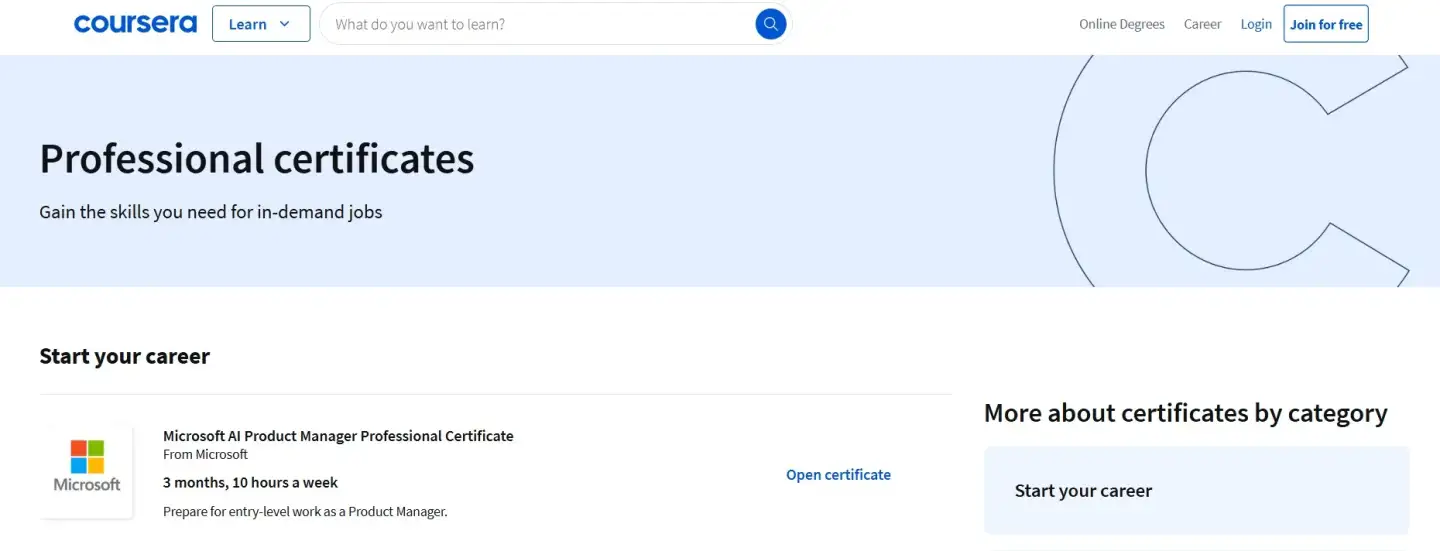
Course certificates that can be shared – produced by Coursera and the partner institution; arrive shortly after you complete all the graded work.
Professional Certificates – a series of courses from companies such as Google or Meta, often featuring additional services for finding a job, which may also consider your prior experience in the field.
MasterTrack Certificates – short courses from a university master’s; if you are later accepted into the full master’s degree program at the University of North Texas, you can use your credits towards it.
You can earn a bachelor’s or master’s degree fully online on the edX homepage, and the certificate will be issued by the university, not Coursera.
edX:

Verified Certificates – you show your ID, pass your assignments and get a certificate from the university.
Career Bundles – these are like Coursera’s career bundles, but fewer are made by corporations.
MicroMasters – a set of graduate courses that counts for 20–30 % of a campus master’s if you enroll in the future.
You can earn a master’s degree from a partner university, such as the University of Michigan, online and the tuition is determined by the school.
Feature |
Coursera |
edX |
|---|---|---|
Issuer on certificate |
University or company + Coursera logo |
University + edX logo |
Typical single-course fee |
$49 – $99 |
$50 – $300 |
Industry-led tracks |
Yes (Google, IBM, Salesforce) |
Limited (IBM, Microsoft) |
Credit toward a degree |
MasterTrack, full degrees |
MicroMasters, full degrees |
Which wins in the edx vs coursera debate? If you want to gain skills that are highly sought after by employers, Coursera is the better choice. If you are interested in graduate school and want to earn credits for your courses, edX is hard to find better. For most career-switchers comparing coursera vs edx, the broader range of professional pathways on Coursera gives it the edge, while edX remains the purist’s choice for university prestige.
Pricing & Value
Money matters as much as course quality and course content, and Coursera vs edX pricing follows two very different playbooks.
Coursera is very flexible. You can review almost any class without paying, since the videos, readings and discussion boards are free. If you wish to get graded and receive a certificate, you pay a one-time fee between $49 and $99. Want to spend a lot of time studying? With Coursera Plus, you can access nearly all the courses and Professional Certificates for just $59 per month or $399 per year. Earning two or three certificates in a year will make the subscription worthwhile. Coursera provides a seven-day free trial and allows you to get a refund within 14 days after making a one-off purchase.
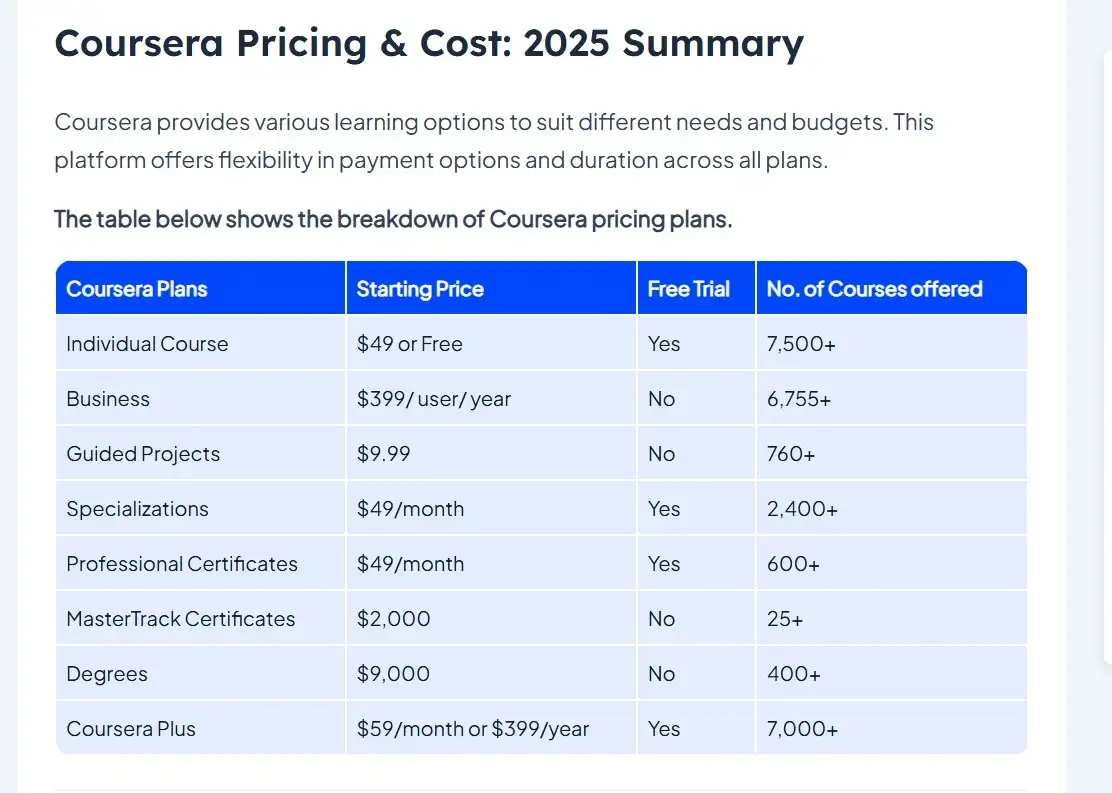
edX courses are less likely to keep you binge-watching. All courses are available to audit for free; to get graded work, access the course forever and earn a certificate, you can upgrade to the Verified Track for $50–$300. No one can learn everything, so those who use a lot pay every time. MicroMasters and Professional Certificates are sold separately and although they are not free, they are still less expensive than studying at a university campus. You could reduce your fees by up to 90 % with financial-aid applications.
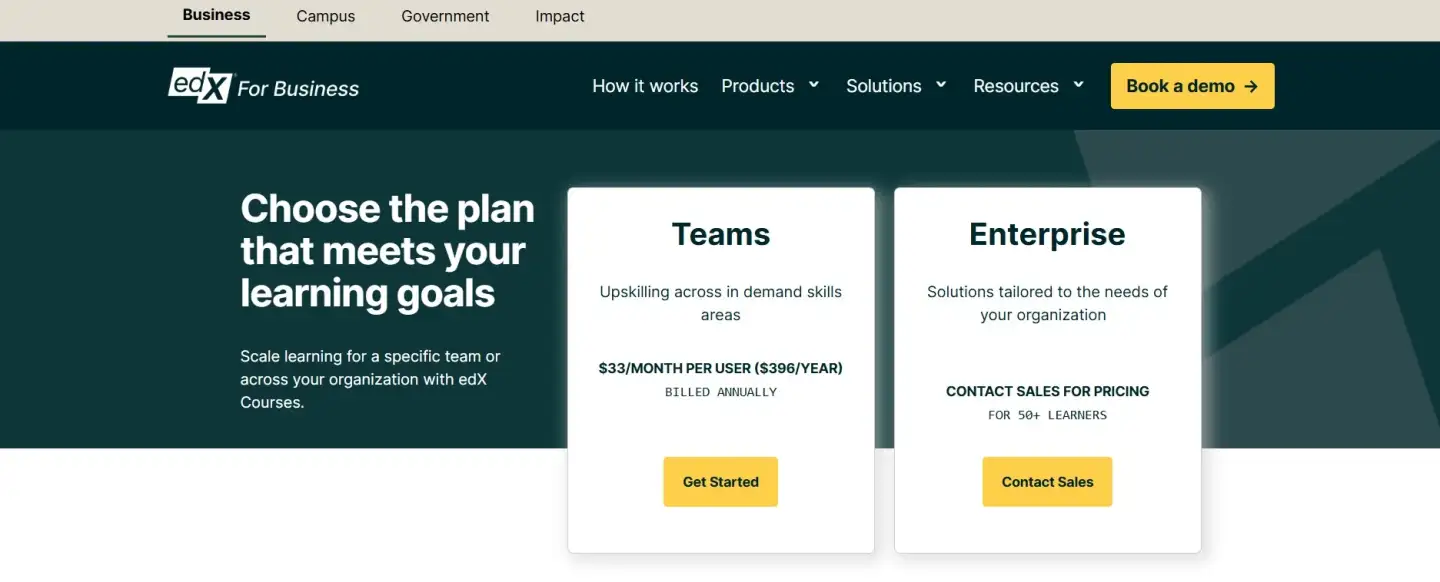
Cost factor |
Coursera |
edX |
|---|---|---|
Free audit access |
Yes |
Yes |
Single-course certificate |
$49–$99 |
$50–$300 |
Unlimited option |
Coursera Plus – $59/mo or $399/yr |
None |
Refund policy |
14 days for courses & annual plan |
14 days for Verified Track |
Financial aid |
Yes |
Yes |
If all you want is one flagship course, the prices at edX and Coursera are similar. As soon as you need more than one certificate, subscribing to Coursera makes each course much more affordable and allows you to earn them faster. If you are only interested in one course, the pay-as-you-go structure from edX seems just. When it comes to the overall edX vs Coursera discussion, Coursera is better for bulk options and edX is better for single classes.
Also you can visit our catalog of Best English Learning Deals and find top tools and use discount code for learning and upgrate your English!
How the App is Used & The Services it Provides
Both sites are attractive and display what they are meant for. Both desktop and mobile versions of Coursera and edX are fast, but Coursera shows you career paths and lists of skills, while edX displays upcoming university classes and the dates they begin. It takes only two clicks on the Netflix-style carousel to switch from “Python for Everybody” to the Google UX Certificate.
Feature |
Coursera |
edX |
|---|---|---|
Mobile app |
iOS/Android; offline video, quiz support |
iOS/Android; offline video |
Progress tools |
Streak tracker, weekly goals, gamified badges |
Syllabus calendar, percentage bar |
Discussion forums |
Lively, instructor-moderated on most courses |
Peer-driven; community TAs for flagship classes |
AI helpers |
Skill-based recommendations, résumé-ready project templates |
edX Xpert (beta) for study hints |
Accessibility |
Full keyboard nav, captions in 40+ languages |
High-contrast mode, captions in 20+ languages |
For first-time MOOC students, Coursera is simpler because it helps you remember to study and you can review your peers even while you are traveling. If you enjoy a traditional classroom with less interaction and more reading and weekly work, edX is for you. So when weighing Coursera vs edX on usability, pick Coursera for intuitive, goal-oriented guidance and edX for a straight-ahead, academic workspace.
Strengths and Trade-offs At a Glance
Feature |
Coursera — where it excels |
Coursera — watch-outs |
edX — where it excels |
edX — watch-outs |
|---|---|---|---|---|
Catalog size & variety |
7 000 + courses, dozens of subjects, fresh corporate content |
Some niche academic topics missing |
≈ 3 300 deep-dive university courses |
Smaller library; limited business/soft-skill options |
Credentials |
Professional Certificates, MasterTrack, full online degrees |
Quality varies by creator |
MicroMasters, credit-eligible master’s classes |
Fewer industry-led certificates |
Pricing model |
Coursera Plus subscription slashes cost per course |
Pricing tiers can confuse newcomers |
Simple pay-per-course; generous free audit |
No unlimited plan—heavy users pay each time |
Learning experience |
Polished UI, adaptive recommendations, offline quizzes |
Gamified streaks aren’t for everyone |
Academic rigor mirrors campus syllabi |
Cohort start dates reduce flexibility |
Career impact |
Job-ready skills from Google, IBM, Meta, Salesforce |
Certificates behind paywall |
Prestige of MIT, Harvard, Oxford on every cert |
Fewer employer-branded tracks |
Although Coursera has more choices and offers more value, edX is better for academics and has straightforward pricing. Would you like to take a variety of classes or do you want something that can officially earn you credits? If you prefer this option, Coursera is the better choice than edX.
Who Should Choose Coursera vs edX?
Are you still unsure if you should choose edX or Coursera for your next learning experience? Select the best platform for every problem you come across.
Pick Coursera If You…
Looking for a way to earn job-related credentials in no time? It takes only a short time to finish the Google Cybersecurity Certificate or Facebook Meta Marketing Analytics track on Coursera and add it to your LinkedIn profile.
Expect to collect a number of certificates. With Coursera Plus, you can take three, four or ten courses in a year without spending money on each course, making it ideal for those who want a new career or enjoy learning new things.
Whenever you can, use learning paths that are guided. You will always know what to focus on next because the roadmaps for “data scientist” and “project manager” have bundled courses, quizzes and capstones.
Look into degree programs that allow you to start later. The modules from MasterTrack can be included in an online master’s program and what you study now may help you earn a diploma later.
Just like a well-made app, mobile users are encouraged by quizzes, badges and suggestions for learning new skills.
Choose edX If You…
Select courses that give you plenty of information. Since the edX courses from Harvard and MIT cover the same topics as the on-campus classes, they are excellent for those interested in graduate school or research.
Looking forward to earning credits for a degree. If you complete a MicroMasters, you can save one semester and less money on your master’s studies.
Take a course that focuses on just one subject instead of several. The only thing you must do is pay for the Verified Track and you will receive a certificate from a good university.
Prefer academic brands over those that are owned by companies. The certificate from edX shows a blue-chip university logo, indicating it is a genuine document.
Look for a phone with only a few buttons. If you want to study without getting distracted, use fewer pop-ups and focus on the lecture notes.
In short, if your goal is breadth, speed, and career momentum, the Coursera vs edX decision tilts toward Coursera. If you wish to study courses that are respected and well-studied, edX is a good choice. Since you can take both coursera and edx for free, the first lesson will help you find the platform that fits your needs.
Bottom line: Coursera takes the crown
Stack the numbers, weigh the credentials, test-drive the apps—every road test in the edX vs Coursera matchup points the same way. Because Coursera has a wide range of courses, certificates supported by industry and an affordable subscription, many learners choose it and use it for years.
Are you prepared to see the shift?
🚀 During this time, you can take any courses, earn your first certificate and see if you want to continue.
FAQ
Yes, for those who want to quickly learn skills needed for a job on various online courses platforms. The larger number of courses, subscription system, and certificates of completion branded by employers give Coursera the advantage. That being said, if you prefer a course that aligns with your personal preferences for interaction, such as having a professor and the chance to earn graduate credit, edX is likely a better option. In short, the coursera vs edx answer hinges on your goal—breadth and career focus (Coursera) or university-style rigor (edX).
Absolutely. Every edX certificate includes the university’s logo, so employers recognize the brand associated with it. While an edX vs Coursera certificate holds similar credibility, the edX badge signals traditional academic rigor, whereas many Coursera certificates highlight industry alignment, backed by verification processes for authenticity.
Yes. You can check out courses on both sites for free. You go through the lectures and study the materials and then you decide if you want to purchase graded work and a certificate. If you’re not sure about edx or coursera, take the courses in audit mode first and pay for them only when you find them worthwhile.
Coursera. With just one annual fee, Coursera Plus allows you to take as many courses as you want. You pay a fee for each course on edX which can get expensive if you take several programs. Subscribing to Coursera is often much cheaper for heavy users than using EdX.
They both do, but they go about it differently. Coursera’s MasterTrack modules and full online degrees are awarded credit by the partner university. edX’s MicroMasters and a few Verified Track courses can be used as credit when you attend a campus program. If you must earn credit, make sure to check the transfer policy for every course before you enroll.
Now, recruiters are aware of both. Coursera’s certificates are designed for specific jobs, while edX’s certificates prove a person’s knowledge in a subject. Having both a credential and project experience will make your story of skills strong, even if you got the credential from coursera and edx.
Last updated: 19.05.2025






